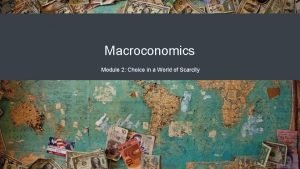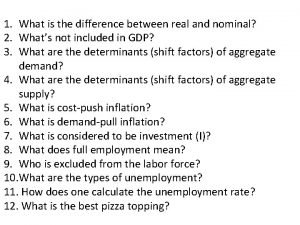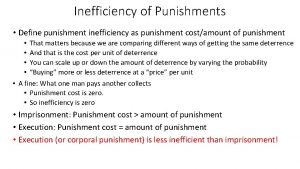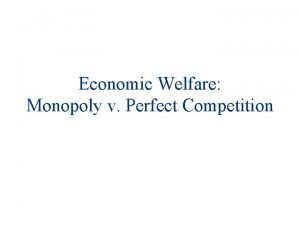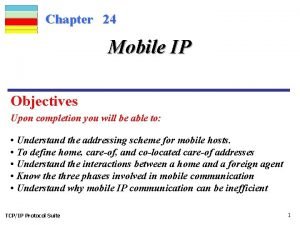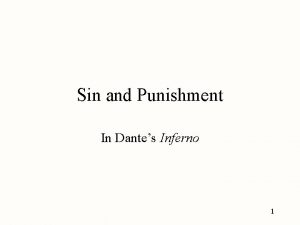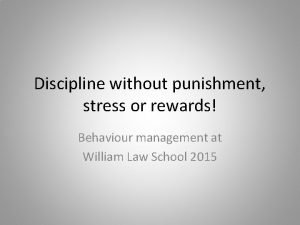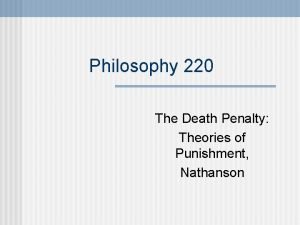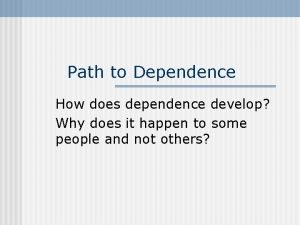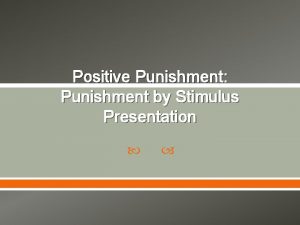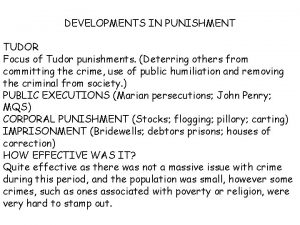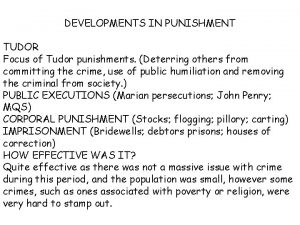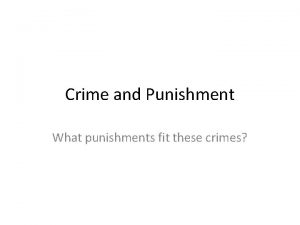Inefficiency of Punishments Define punishment inefficiency as punishment














- Slides: 14

Inefficiency of Punishments • Define punishment inefficiency as punishment cost/amount of punishment • That matters because we are comparing different ways of getting the same deterrence • And that is the cost per unit of deterrence • You can scale up or down the amount of deterrence by varying the probability • “Buying” more or less deterrence at a “price” per unit • A fine: What one man pays another collects • Punishment cost is zero. • So inefficiency is zero • Imprisonment: Punishment cost > amount of punishment • Execution: Punishment cost = amount of punishment • Execution (or corporal punishment) is less inefficient than imprisonment!

To Minimize Punishment Cost • Choose the most efficient punishment • Consider an offense currently punished with five years in prison • We determine that is equivalent, for the criminal, to 1/6 chance of execution • So when someone is convicted, we roll a die • • • 1 -5 we turn him loose 6 we hang him Deterrence is the same, so victims are no worse off The average cost to the criminal is the same And we save the cost of running the prison • What is wrong with this argument?

The Inefficiency of Efficient Punishment • Consider first a less extreme version • • Every sentence is X dollars or Y years The criminal has the option of spending Y years in the state prison Or accepting an offer from a private prison to pay his $X fine In exchange for something less than Y years working in their prison factory • I proposed that idea in an old article. Someone responded • The colonial powers in Africa had a similar approach • If they needed a road built, they found an excuse to arrest a bunch of people • And sentenced them to work on the road • Larry Niven had sf stories with a different variant • • There is always a shortage of organs. So when a criminal is executed, his organs forfeit to the state for transplant With that rule there is still a shortage, so increase the number of capital offenses In “The Jigsaw Man, ” multiple speeding convictions etc. add up to a capital offense • We need to think about the incentives of the enforcers as well as the enforcees

Prosecution as Rent Seeking • We are back with the incentive to prosecute • The civil version of the problem • Targeting deep pockets instead of guilt • Via punitive damages or class actions • Civil forfeiture for criminal offenses • My proposal puts your ownership of your labor at risk • Niven’s puts the value of your organs at risk • My dice rolling isn’t quite as bad, since there is no profit to hanging someone • But if punishment is cheap and potential defendants have little political power • We may be too willing to punish. • A new argument against (cheap) capital punishment

What is Wrong with Cannibalism? • People die, why waste the meat? • I can choose not to carry money, but not to carry my body • This is the best argument I know of against a market for organs • It looks like an obviously good idea, but … • You could be worth $50, 000 on the hoof • So better combine it with strong rules on chain of title • It also explains why rape is much more common than murder • “A virgin with a sack of gold can walk safely from one end of the empire to the other” • The sack of gold could be kept in a safe • Again rent seeking

Antitrust

What is Wrong with Monopoly Anyway? • A competitive firm increases production as long as price is above marginal cost, • So in equilibrium P=MC • Which means that anyone who values the good above the cost of producing it gets it • The efficient pattern • A monopoly selling all units at the same price • • • Can increase its sales only by lowering its price So stops when price is above MC By enough that the gain on the last unit balances the reduction of revenue on the others Which means that some who value the good at more than its cost of production don’t get it Which is inefficient • Price discrimination can reduce this problem • Charge a high price to those willing to pay it, a low price to those not • Ideally selling to everyone willing to pay anything more than MC • Making ten cents is better than making nothing • Perfect price discrimination entirely eliminates this inefficiency • Imperfect price discrimination can reduce or increase it • Since the goods may go to someone with a low value in the population charged a low price • Instead of someone with a higher value in the group charged an even higher high price • But perfect price discrimination creates a new inefficiency • A firm spending money to make sure that it is the one that ends up with the monopoly • And the monopoly profit • For instance by entering the market early, losing money for a while.

Why is Monopoly? • Natural Monopoly exists if • Economies of scale continue up to the full size of the market, so that • One big firm can produce at lower cost than several smaller ones • But large firms face diseconomies of scale—too many layers between factory floor and boss • So natural monopoly is more common in small markets • The only general store in a small town • The only public speaker who gives the sort of lectures I give • Your favorite mystery writer • Artificial monopoly. The idea is that a large firm not a natural monopoly • Drives all competitors out by selling at a loss, since it has deeper pockets • But it is also losing money faster, since it is bigger • This is the usual story about Standard Oil but not supported by the evidence • Government monopoly • The Post Office is a monopoly because it is illegal to compete in first class mail • Airlines under regulation or licensed professions have entry restricted by law

Possible Solutions • Natural monopoly • Break it up—but that raises costs, creates an unstable situation • Regulate it? • If it is forced to sell at MC it goes broke, since it presumably has fixed costs as well • So either sell at MC and have a government subsidy • Or try to make it sell at average cost • This runs into the obvious regulatory problems • Regulator doesn’t know what MC or AC should be • If subsidy or price are set to cover costs, no incentive to hold down costs • And regulator may have no incentive to regulate for maximum efficiency • Artificial monopoly • • Not a problem if it doesn’t exist Various laws try to prevent selling below cost But that also hurts a new firm trying to break into the market And cost may not be well defined for purposes of regulation • State monopoly: The simple solution is not to have it

Cartels • A market with room for only a few firms • • • If they can get together, reduce output, raise price, profits go up At the higher price, each firm has an incentive to cheat on the agreement Since the price is above the cost of production And one firm’s increase won’t push prices down very much From the standpoint of the cartel, this is an externality problem From the standpoint of the customers, a feature not a bug • Enforcing a cartel agreement by contract is not permitted under current U. S. law • But it can be enforced by a regulator who wants to support the cartel • Either by controlling prices, as in the case of the Civil Aeronautics Board • Or by controlling entry • Regulation of trucking and health care required a permit to run a route, build in an area • Professional licensing controls the number of doctors, hair braiders, … • And since one person can only work so long, that controls total output, hence price

Extending the Monopoly: Four steps • The argument: Use a monopoly in one market to get a monopoly in another • Require users of your (monopoly) computer to use your punch cards • Use a monopoly in steel to get a monopoly in autos • Resale price maintenence: Use wholesale monopoly to get retail monopoly profit • The rebuttal: Doing that gets you no additional profit • The more the punch cards cost the less people will pay for the computer • The steel monopolist can push up the prices of autos without running auto companies • Similarly for the wholesale monopolist: Let the retailers compete down their margins • The puzzle: Then why do tie-in sales, vertical monopoly and RPM happen? • Possible answers • Tie in sales might be a way of price discriminating against heavy users • Vertical integration from steel to autos (which didn’t happen, but …) • Could reduce the inefficiency due to charging auto companies a high price for steel • And so giving them an incentive to substitute fiberglass or aluminum • Even when, at the cost of producing steel, steel is cheaper • Holding up the retail price gets retailers to compete on non price dimensions • Such as costly showrooms • Which their competitors could free ride on

One More Puzzle • Why isn’t use of the showroom or equivalent sold separately? • A new business model • • Set up a minivan test agency Buy one each of the available brands Charge customers by the hour to test drive, consult your experts, read your literature Point them at whatever sellers provide the lowest prices • Speaking as a customer … • It would make it easier for me to compare different models • It would be in their interest to point me at the least expensive sellers • And their experts wouldn’t be trying to sell me a particular model • Why doesn’t that model exist?

Monopoly in Silicon Valley • Software has unlimited scale economy • Since MC ~= 0 • Although not true of support costs • It is argued that it also has network externalities • If everyone else is using Word, that makes it convenient for me to use Word • This is the Qwerty/Dvorak story • Supposedly the Qwerty keyboard was very inefficient, but got an early lead • Designed to slow typists down to avoid key jams—a disadvantage with better typewriters • Won an early speed contest because it had the world’s only touch typist • And so continued in use even though the Dvorak layout was much better • Since typists had to be able to use the typewriters offices had • “The Fable of the Keys” argues that this story is entirely mythical • • • The design was to get typists to alternate hands, to avoid jamming the key bank There were lots of contests and lots of similarly fast typists The evidence for the superiority of the Dvorak keyboard was puffery by Dvorak Many typists preferred their own typewriter, and changing the layout was easy Firms that tried switching to Dvorak found it at best slightly better • The authors have also argued that the observed pattern in software • Is serial competition. One program dominates for a while • Then a new competitor starts getting better reviews • And everyone switches (Liebowitz and Margolis)

Path Dependence • That story is one version of path dependence • In that case due to network externalities • Whichever keyboard layout is used early is retained even if inferior • Even if that example is bogus, others might not be • • Either because of network externalities. Consider languages Or because of the accumulation of small improvements Perhaps steam engine cars would be better than internal combustion cars If they had the same long sequence of improvements • For another version, consider the great man version of history • If Julius Caesar, or Napoleon, or Mohammed, or Newton hadn’t lived • The world thereafter would have been very different • Or perhaps not • Or the idea of decisive battles • If Harald Hardraada had not invaded just before William the Conqueror • Harold might have won Hastings, England never been conquered • Or won Hastings and then lost against Harald, England conquered by Norway • Would that have mattered? • England already had a lot of Norman influence • And had been conquered by Norway before (Canute) • Did one bullet at Chancellorsville change the outcome of the Civil War?
 Productive inefficiency and allocative inefficiency
Productive inefficiency and allocative inefficiency Productively efficient vs allocatively efficient
Productively efficient vs allocatively efficient Define inefficiency
Define inefficiency Monopoly deadweight loss
Monopoly deadweight loss Inefficiency in mobile ip
Inefficiency in mobile ip X inefficiency
X inefficiency Marshallian inefficiency
Marshallian inefficiency Victorian punishments at school
Victorian punishments at school Victorian school punishments
Victorian school punishments Circles of hell
Circles of hell Inferno punishments
Inferno punishments Discipline without punishment
Discipline without punishment The target person complies in order to obtain
The target person complies in order to obtain Good nnn punishments
Good nnn punishments Nnn punishments
Nnn punishments
